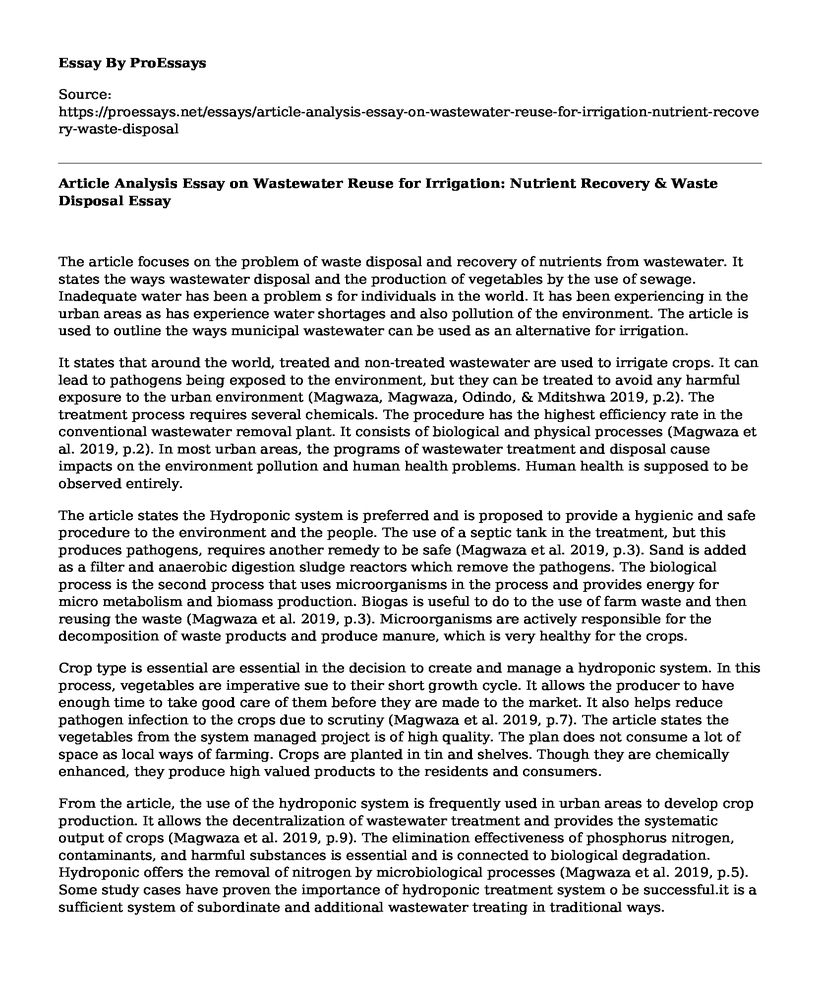The article focuses on the problem of waste disposal and recovery of nutrients from wastewater. It states the ways wastewater disposal and the production of vegetables by the use of sewage. Inadequate water has been a problem s for individuals in the world. It has been experiencing in the urban areas as has experience water shortages and also pollution of the environment. The article is used to outline the ways municipal wastewater can be used as an alternative for irrigation.
It states that around the world, treated and non-treated wastewater are used to irrigate crops. It can lead to pathogens being exposed to the environment, but they can be treated to avoid any harmful exposure to the urban environment (Magwaza, Magwaza, Odindo, & Mditshwa 2019, p.2). The treatment process requires several chemicals. The procedure has the highest efficiency rate in the conventional wastewater removal plant. It consists of biological and physical processes (Magwaza et al. 2019, p.2). In most urban areas, the programs of wastewater treatment and disposal cause impacts on the environment pollution and human health problems. Human health is supposed to be observed entirely.
The article states the Hydroponic system is preferred and is proposed to provide a hygienic and safe procedure to the environment and the people. The use of a septic tank in the treatment, but this produces pathogens, requires another remedy to be safe (Magwaza et al. 2019, p.3). Sand is added as a filter and anaerobic digestion sludge reactors which remove the pathogens. The biological process is the second process that uses microorganisms in the process and provides energy for micro metabolism and biomass production. Biogas is useful to do to the use of farm waste and then reusing the waste (Magwaza et al. 2019, p.3). Microorganisms are actively responsible for the decomposition of waste products and produce manure, which is very healthy for the crops.
Crop type is essential are essential in the decision to create and manage a hydroponic system. In this process, vegetables are imperative sue to their short growth cycle. It allows the producer to have enough time to take good care of them before they are made to the market. It also helps reduce pathogen infection to the crops due to scrutiny (Magwaza et al. 2019, p.7). The article states the vegetables from the system managed project is of high quality. The plan does not consume a lot of space as local ways of farming. Crops are planted in tin and shelves. Though they are chemically enhanced, they produce high valued products to the residents and consumers.
From the article, the use of the hydroponic system is frequently used in urban areas to develop crop production. It allows the decentralization of wastewater treatment and provides the systematic output of crops (Magwaza et al. 2019, p.9). The elimination effectiveness of phosphorus nitrogen, contaminants, and harmful substances is essential and is connected to biological degradation. Hydroponic offers the removal of nitrogen by microbiological processes (Magwaza et al. 2019, p.5). Some study cases have proven the importance of hydroponic treatment system o be successful.it is a sufficient system of subordinate and additional wastewater treating in traditional ways.
The suggestion is to practice the closed system water circulation system to avoid issues relates to insufficient land for water treatment and farming crop making in the commercial areas. The article suggested and has given enough evidence that a hydroponic system is a appropriate procedure for the waste treatment scheme (Magwaza et al. 2019, p.11). It can help in the production of food in which food production in urban areas is a big challenge to the residents.
Reference
Magwaza, S.T., Magwaza, L.S., Odindo, A.O. and Mditshwa, A., 2019. Hydroponic technology as decentralised system for domestic wastewater treatment and vegetable production in urban agriculture: A review. Science of The Total Environment, p.134154.
Cite this page
Article Analysis Essay on Wastewater Reuse for Irrigation: Nutrient Recovery & Waste Disposal. (2023, Mar 12). Retrieved from https://proessays.net/essays/article-analysis-essay-on-wastewater-reuse-for-irrigation-nutrient-recovery-waste-disposal
If you are the original author of this essay and no longer wish to have it published on the ProEssays website, please click below to request its removal:
- Essay on the Book Deaf Like Me
- Building the Nursing Profession Essay Example
- Say No to Plastic Straws: Why We Need to Act Now - Essay Sample
- Essay Example on Language Barrier Overcome: My Most Notable Nursing Experience
- Essay Example on Nurses: The Heart of Healthcare Despite Scarce Resources
- Paper Example on Analysis of Helmet Lattice Liner Performance on Mitigating TBI
- Paper Example on Hospital Readmissions: Assessing Quality & Cost of Healthcare Service Delivery in US







